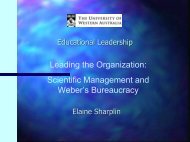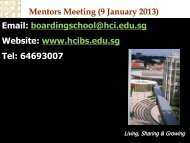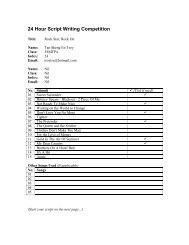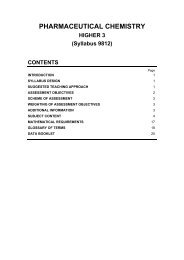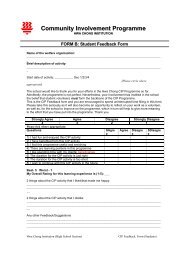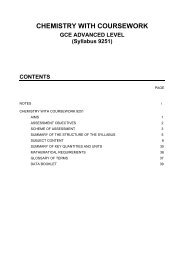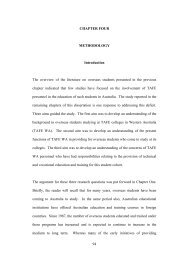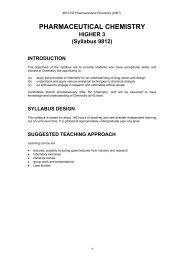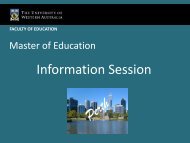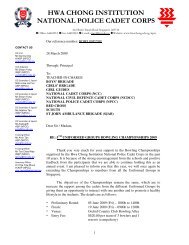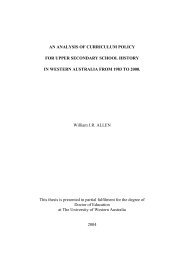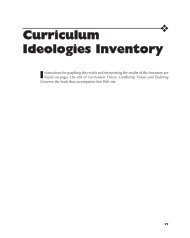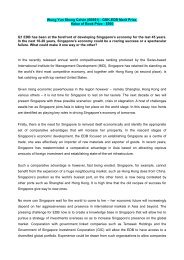EDUC 8678 - Pre-reading - Curriculum and its discontents
EDUC 8678 - Pre-reading - Curriculum and its discontents
EDUC 8678 - Pre-reading - Curriculum and its discontents
Create successful ePaper yourself
Turn your PDF publications into a flip-book with our unique Google optimized e-Paper software.
CURRICULUM AND ITS DISCONTENTS<br />
165<br />
is something out there to be viewed, something worth pondering <strong>and</strong><br />
discussing. That something, <strong>and</strong> on this the four of us also seem to agree,<br />
has chiefly to do with the intellectual outlook <strong>and</strong> occupational activity of<br />
those people who are or have been professionally engaged in speaking <strong>and</strong><br />
writing about the curriculum of schools <strong>and</strong> closely related topics. This is a<br />
rather long-winded <strong>and</strong> loose definition of the "reality" in which we are<br />
jointly interested, but anything more precise begins to exclude things that I<br />
believe all four of us want to discuss. Also, I admit to sharing in the general<br />
confusion over what to call all those people who have something<br />
important to say about curricular matters, but rather than offering yet<br />
another neologism to pin on that amorphous glob, I shall dodge the issue.<br />
Now when it comes to saying what it is about the outlook <strong>and</strong> activity<br />
of these speakers <strong>and</strong> writers <strong>and</strong> practitioners that is worth pondering <strong>and</strong><br />
discussing, Schwab, Huebner, Pinar, <strong>and</strong> I begin to drift apart, not only<br />
them from me but each from the other. Yet even then I suspect we might<br />
still be in enough agreement to speak in a single voice on one additional<br />
point, which is that some important changes seem to be occurring within<br />
our loosely defined reality. More precisely, a growing number of people<br />
within my unlabeled glob seem to be unhappy about what other members<br />
of the glob, perhaps the majority, are doing or have done. Our reality, in<br />
other words, is permeated by a widespread spirit of discontent.<br />
Why this is so, <strong>and</strong> what, if anything, can or should be done about it, are<br />
the two most important questions to ask. I suspect that Schwab, Huebner,<br />
<strong>and</strong> Pinar would agree. Beyond this point, however, the four of us seem to<br />
part company. But rather than attempting any further specification of the<br />
differences between my view <strong>and</strong> theirs, I would prefer to concentrate on<br />
what I perceive to be true <strong>and</strong> my own interpretation of that perception.<br />
Disagreements with others will likely be evident in my discussion, so I<br />
won't bother to point them out.<br />
If, as I claim, a spirit of discontent is sufficiently widespread to be<br />
commented upon by almost any thoughtful observer, then this must mean<br />
there is a potentially identifiable person or, more likely, group of persons<br />
responsible for generating <strong>and</strong> disseminating it. Who are they? Who are<br />
these people whom I have labeled "Discontents" in the title of this paper?<br />
And what are they discontented about?<br />
My answer to the first of these key questions is aided by sp<strong>reading</strong> out<br />
that map of the United States <strong>and</strong> Western Europe that most of us<br />
memorized as children <strong>and</strong> that we continue to keep tucked away in our<br />
heads for just such an occasion. On it I locate three centers of activity from<br />
which the clearest, or at least the loudest, expressions of discontent seem to<br />
emanate. Two of these are in Engl<strong>and</strong>, <strong>and</strong> the third is in the United States.<br />
The precise location of one of the British centers I would place at the<br />
Institute of Education of the University of London. The other I would<br />
place, with somewhat less confidence, at the University of East Anglia. The<br />
American center is not as easy to pinpoint, beyond saying that it lies<br />
somewhere west of New York City <strong>and</strong> east of the Mississippi. If I had to<br />
stick a tack in a map to give this center a home, I suppose I would close my<br />
eyes <strong>and</strong> aim for Hershey, Pennsylvania, or thereabouts. But don't ask me



